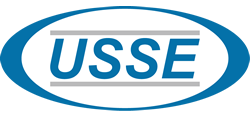Hot melt adhesive application nozzles, or nozzle tips as they are commonly called, are the component that apply the glue onto boxes in packaging lines. Universal Systems nozzles are made out of brass with stainless steel tips to withstanding any beating they might take from box flaps in the packaging line.
Nozzles comes in many shapes and sizes, and are usually the part on the adhesive system that is most experimented with. Most nozzles are easily changed out by simply unscrewing them from the module. Other nozzles, like the ones on reduced cavity, zero cavity and ProBead modules are called integrated nozzles. We sell replacement nozzle kits for integrated nozzles that include the nozzle tip, needle, brass needle guide and installation tool.
The diameter of the nozzle tip determines the amount of adhesive that is distributed onto the box flap. Because you can easily switch them out, most line operators experiment with diameter to enhance productivity. For example, smaller, more precise glue application will require a smaller diameter nozzle. Larger, faster cartoners, will most likely run larger diameter nozzles to distribute a greater amount of glue and quickly seal boxes. Keep in mind that the larger the diameter nozzle, the more adhesive your tank will process. So make sure that your line operators are keeping a close eye on the adhesive level in the tanks. Dry running a machine can compromise your pump and create a costlier repair.
Because most adhesive systems run 24/7, the nozzle is the most commonly clogged component on your line. This is due to char or debris travelling from the tank, through the hose, into the gun and through the module. Because the nozzle is the smallest orifice on your system, most char will get stuck and you will be unable to get a consistent adhesive flow. Universal Systems SE offers nozzle cleaning kits that you can purchase instead of replacing nozzles. However, most line operators find the cleaning of nozzles a tedious process, even though when done correctly it works. Nozzle cleaning kits can save you money in the long run on replacing nozzles.
Another important aspect of nozzle diameter correlates to the size of the mesh in-line filter used on your system. The larger the diameter nozzle, the lower number mesh you should use. The smaller the diameter nozzle, the finer mesh you should use. For example, with a .024 diameter nozzle, you should have a 50 mesh filter size. With a .012 diameter nozzle, you should use 200 mesh filters.
For more information about what diameter nozzle you should be using, call (561) 272-5442 or email sales@ussefl.com.


